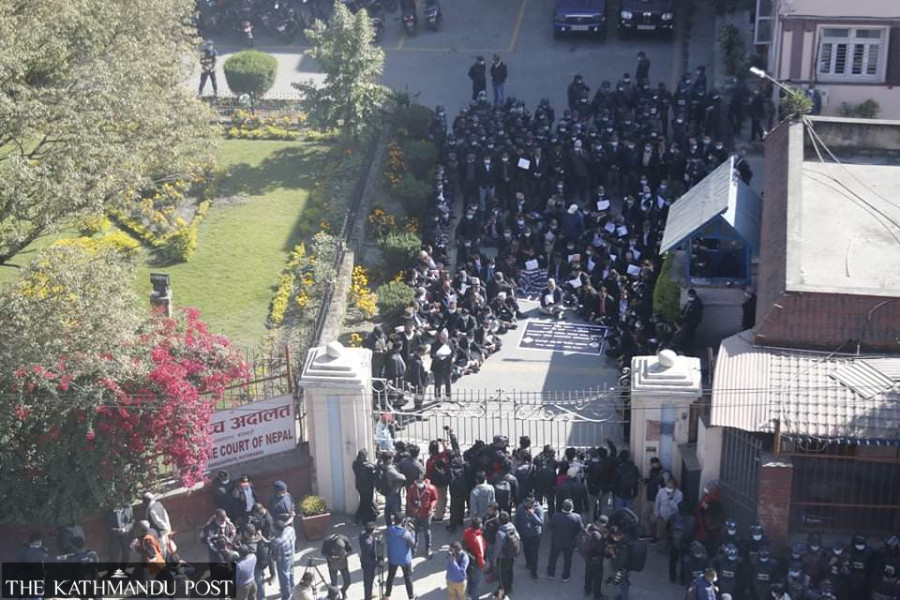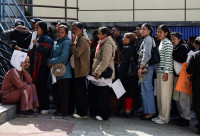National
Calls for House session as judicial crisis protracts
Observers say the House should be summoned so that lawmakers can discuss the disputes in the Supreme Court.
Binod Ghimire
The tug of war in Nepal’s judiciary continues. There is a debate if the executive can take any position on the crisis in the Supreme Court. The legislature, another organ of the state, is the only place from where removal of Chief Justice Cholendra Shumsher Rana, which is the main demand of the protesting lawyers and justices, is possible.
However, the federal parliament is not in session. President Bidya Devi Bhandari, on the recommendation of the government, prorogued the last session on October 29.
Calls are now growing that the government should recommend a new House session so that elected representatives have their platform to discuss the crisis in the judiciary.
Lawmakers say, in principle, the judiciary itself should find a solution to the current crisis, but since the standoff has continued, it should be discussed in Parliament.
“It doesn’t look like the judiciary can resolve the issues on its own. Now, the ruling alliance must make its position clear on the matter,” Giriraj Mani Pokharel, a Standing Committee member of the Communist Party of Nepal (Maoist Centre), told the Post. “Also, the House session should commence to discuss the matter if the stalemate continues.”
Supreme Court justices stopped cooperating with the chief justice from October 25.
The standoff in the judiciary began on October 31 after the Nepal Bar Association and Supreme Court Bar launched protests against Rana. Rana has been dodging the lawyers who are staging sit-ins at the main gate of the Supreme Court to prevent him from entering the court. He has also been assigning cases to the agitating justices who are boycotting the benches. The confrontation has escalated. Justices are now under pressure as they cannot boycott the benches forever. They want political parties to take up the issue, but politicians have maintained silence.
Even in party meetings, leaders are barely discussing the crisis in the judiciary. On Sunday, Nepali Congress President and Prime Minister Sher Bahadur Deuba tried to stop Gagan Thapa, a lawmaker, from discussing the Supreme Court issue at the party’s Central Working Committee meeting.
“Let’s not discuss the court [issue],” a leader quoted Deuba as saying. Thapa, however, put forth his views stressing the need for the party to make its position clear on what is going on in the Supreme Court.
Many say if a House session is called, lawmakers can debate the Supreme Court issue, which could make it easier for parties to make their positions clear. While parties have said they are concerned about the crisis in the judiciary, almost all of them have maintained that the institution should find a solution from within.
The CPN (Unified Socialist) said on Sunday that its attention had been drawn to the ongoing crisis in the judiciary.
“We urge political parties and stakeholders from the judiciary to make a common position so as to find a solution to the crisis,” the party said in a statement.
The main opposition CPN-UML says it would be a good decision to call the House session where a host of issues including the judiciary crisis can be discussed.
“Our party agrees that there has to be an intense discussion on the matter related to the Supreme Court to find a long-term solution,” Bishal Bhattarai, chief whip of the party, told the Post.
He, however, said his party would obstruct the House proceedings unless Speaker Agni Sapkota addresses their demands.
The UML on August 17 had written to the Parliament Secretariat, asking it to issue a notice regarding its decision to expel 14 of its dissenting lawmakers. But Sapkota refused to issue any notice. The same lawmakers, who were expelled by the UML, later formed the CPN (Unified Socialist).
The UML then resorted to obstructions, not letting the House to function for the entire session that lasted 51 days starting September 8.
Bhattarai said Rana’s resignation alone won’t break the deadlock.
“Implementation of the report prepared by Justice Hari Krishna Karki would help bring reforms in the Supreme Court,” said Bhattarai. “We are ready to make our position clear through Parliament if the government and Speaker create an environment for smooth functioning of the House.”
A report by a panel led by Karki in July revealed that there was rampant corruption and irregularities in the judiciary. The 250-page report points out that the unfair appointment process of the judges and justices is the root cause for the malpractice.
Observers say it is already late to commence the House meeting.
Daman Nath Dhungana, a former Speaker and a civil society leader, said the parties should make their positions clear on the deadlock while the Parliament should also hold intense discussion on the matter.
“People’s representatives must discuss and build a position to end the stalemate. The lawmakers and even the protesters should lobby the government for the resumption of the House session,” Dhungana told the Post.
The President on the recommendation of the government summons a parliamentary session.
Dhungana said even President Bhandari as the custodian of the constitution should take note of the goings on in one of the key state organs.
“The President can at least hold consultations with the chief justice, justices, government officials and political parties,” said Dhungana. “Prime Minister Sher Bahadur Deuba should have called a meeting of the Constitutional Council as well to discuss the matter as it is the only mechanism that has the representation of every state organ.”
The Constitutional Council, headed by the prime minister, has the chief justice, House Speaker, National Assembly chair, deputy Speaker and the leader of the main opposition as members.
“I am surprised that the government has shown no interest in summoning Parliament or a meeting of the Constitutional Council,” said Dhungana, “even as the judiciary has been paralysed.”




 20.9°C Kathmandu
20.9°C Kathmandu














